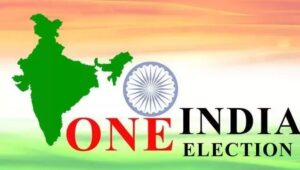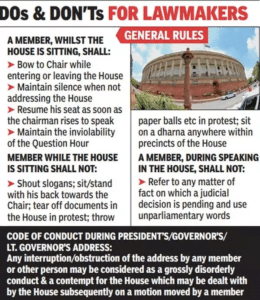Parliament should not be turned into a forum for verbal abuse.
Relevance
- GS Paper – 2, GS Paper – 4, Parliament.
- Tags: #Code of Conduct, #Parliamentary Decorum, #Ethics Committee, #Code of Conduct in Rajya Sabha, #Code of Conduct in Lok Sabha.
Why in the news?
- Recently, Prime Minister Narendra Modi had called for a new chapter in parliamentary history, and exhorted members to “forget all past bitterness”, as they moved into a shiny new building last week.
- Disruptive behavior within India’s Parliament is on the rise, leading to concerns about declining decorum and public perception, as well as its impact on governance.
Concerns and consequences of disruptive behavior in India’s Parliament
- Obstruction of Meaningful Debate: Disruptive behavior obstructs meaningful debate on important issues, preventing critical legislation from being discussed and passed.
- Weakening of Governance: Prolonged disruptions impede the government’s ability to implement policies and address the needs of the population, leading to weakened governance.
- Erosion of Parliamentary Decorum: Disruptive behavior has led to a noticeable erosion of parliamentary decorum and traditional standards of conduct.
- Negative Public Perception: Disruptions have contributed to a negative public perception of the Parliament, potentially leading to disillusionment with the democratic process.
- Decline in Accountability: Leniency towards disruptive behavior has undermined the accountability of elected representatives.
- Loss of Legislative Productivity: Frequent disruptions have resulted in a loss of valuable legislative time and productivity.
- Threat to Democracy: The disruptive behavior poses a threat to India’s democratic system by hindering the functioning of democratic institutions and diminishing their credibility.
British parliamentary techniques that the Indian parliament must learn and implement
Opposition Day
- In the British parliamentary system, Opposition Day allows the opposition parties to select specific policy areas or issues they want to bring to the floor of the House for debate.
- This practice provides the opposition with a designated platform to express their views, criticize government policies, and propose alternatives.
- It promotes constructive debate on matters of political significance and ensures that the government must address issues raised by the opposition.
Prime Minister’s Question Time (PMQs)
- PMQs is a significant and widely watched parliamentary event in the United Kingdom.
- During PMQs, MPs have the opportunity to question the Prime Minister about various issues.
- This practice enhances transparency, accountability, and scrutiny of the government’s actions and decisions.
- It is known for spirited exchanges and serves as a key aspect of the British parliamentary system’s tradition of executive accountability.
Code of Conduct in Rajya Sabha
- The First Report of the Ethics Committee was adopted on December 15, 1999.
- The Fourth Report was adopted by Rajya Sabha on April 20, 2005, and a 14-point Code of Conduct for members of the House was formed and was implemented. Major points included in Code of Conduct are:
- If Members find that there is a conflict between their personal interests and the public trust which they hold, they should resolve such a conflict in a manner that their private interests are subordinated to the duty of their public office.
- Members must not do anything that brings disrepute to the Parliament and affects their credibility.
- Members holding public offices should use public resources in such a manner as may lead to public good.
- Members should always see that their private financial interests and those of the members of their immediate family do not come in conflict with the public interest and if any such conflict ever arises, they should try to resolve such a conflict in a manner that the public interest is not jeopardized.
- Members should never expect or accept any fee, remuneration or benefit for a vote given or not given by them on the floor of the House, for introducing a Bill, for moving a resolution or desisting from moving a resolution, putting a question or abstaining from asking a question or participating in the deliberations of the House or a Parliamentary Committee.
Code of Conduct in Lok Sabha
- The first Ethics Committee in Lok Sabha was constituted on May 16, 2000.
- The Report of the Ethics Committee — with regard to amendments to the Rules of Procedure and Conduct of Business in Lok Sabha was laid on the table of the House on December 18, 2014. Its recommendations were included in the report of the Rules Committee of Lok Sabha tabled in Lok Sabha on August 5, 2015.
- It said that the Ethics Committee will formulate a Code of Conduct for Members and suggest amendments or additions to the Code of Conduct from time to time. The matter has since been pending with the Ethics Committee.
International Examples
- In the UK, a code of conduct for MPs was “prepared pursuant to the Resolution of the House of 19 July 1995”.
- The Canadian House of Commons has a Conflict of Interest and Ethics Commissioner with powers to examine violations of the Conflict of Interest Code at the request of another Member or by Resolution of the House or on his own initiative.
- Germany has had a Code of Conduct for members of the Bundestag since 1972.
- The US has had a Code since 1968.
- Pakistan has a Code of Conduct for members of the Senate.
What else?
- Speaker’s Role: The Speaker should reconsider the frequent rejection of adjournment motions and the practice of grouping proposed amendments to bills for voice votes without discussion.
Way Forward
- India’s Parliament stands at a crossroads, with its credibility and functionality at stake due to persistent disruptions.
- By adopting some of the practices of the British parliamentary system and ensuring a more inclusive and accountable parliamentary culture, India can reinvigorate its democratic institutions and preserve the sanctity of its democracy. It is imperative for the government and the opposition to come together on these fundamental matters to salvage the integrity of the Parliament and the nation’s democracy.
Source: The Hindu.
Mains Question
“Political parties must evolve a consensus on the code of conduct for their members both inside the Parliament and out of it, otherwise, people might soon lose faith in our political processes and institutions.” Comment.





